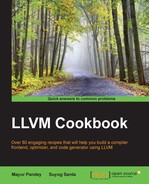In this recipe, you will learn how to parse a binary expression.
We must have the custom-defined language—that is, the toy language in this case—and also stream of tokens generated by lexer. The binary expression parser requires precedence of binary operators for determining LHS and RHS in order. An STL map can be used to define precedence of binary operators.
To parse a binary expression, proceed with the following code flow:
- Open the
toy.cppfile as follows:$ vi toy.cpp
- Declare a
mapfor operator precedence to store the precedence at global scope in thetoy.cppfile as follows:static std::map<char, int>Operator_Precedence;
The TOY language for demonstration has 4 operators where precedence of operators is defined as
-<+</<*. - A function to initialize precedence—that is, to store precedence value in
map—can be defined in global scope in thetoy.cppfile as follows:static void init_precedence() { Operator_Precedence['-'] = 1; Operator_Precedence['+'] = 2; Operator_Precedence['/'] = 3; Operator_Precedence['*'] = 4; } - A helper function to return precedence of binary operator can be defined as follows:
static int getBinOpPrecedence() { if(!isascii(Current_token)) return -1; int TokPrec = Operator_Precedence[Current_token]; if(TokPrec <= 0) return -1; return TokPrec; } - Now, the
binaryoperator parser can be defined as follows:static BaseAST* binary_op_parser(int Old_Prec, BaseAST *LHS) { while(1) { int Operator_Prec = getBinOpPrecedence(); if(Operator_Prec < Old_Prec) return LHS; int BinOp = Current_token; next_token(); BaseAST* RHS = Base_Parser(); if(!RHS) return 0; int Next_Prec = getBinOpPrecedence(); if(Operator_Prec < Next_Prec) { RHS = binary_op_parser(Operator_Prec+1, RHS); if(RHS == 0) return 0; } LHS = new BinaryAST(std::to_string(BinOp), LHS, RHS); } }Here, precedence of current operator is checked with the precedence of old operator, and the outcome is decided according to LHS and RHS of binary operators. Note that the binary operator parser is recursively called since the RHS can be an expression and not just a single identifier.
- A
parserfunction for parenthesis can be defined as follows:static BaseAST* paran_parser() { next_token(); BaseAST* V = expression_parser(); if (!V) return 0; if(Current_token != ')') return 0; return V; } - Some top-level functions acting as wrappers around these
parserfunctions can be defined as follows:static void HandleDefn() { if (FunctionDefnAST *F = func_defn_parser()) { if(Function* LF = F->Codegen()) { } } else { next_token(); } } static void HandleTopExpression() { if(FunctionDefnAST *F = top_level_parser()) { if(Function *LF = F->Codegen()) { } } else { next_token(); } }
- All of the remaining recipes in this chapter pertain to user objects. For detailed parsing of expressions, and for C++ parsing, please refer to: http://clang.llvm.org/doxygen/classclang_1_1Parser.html.
